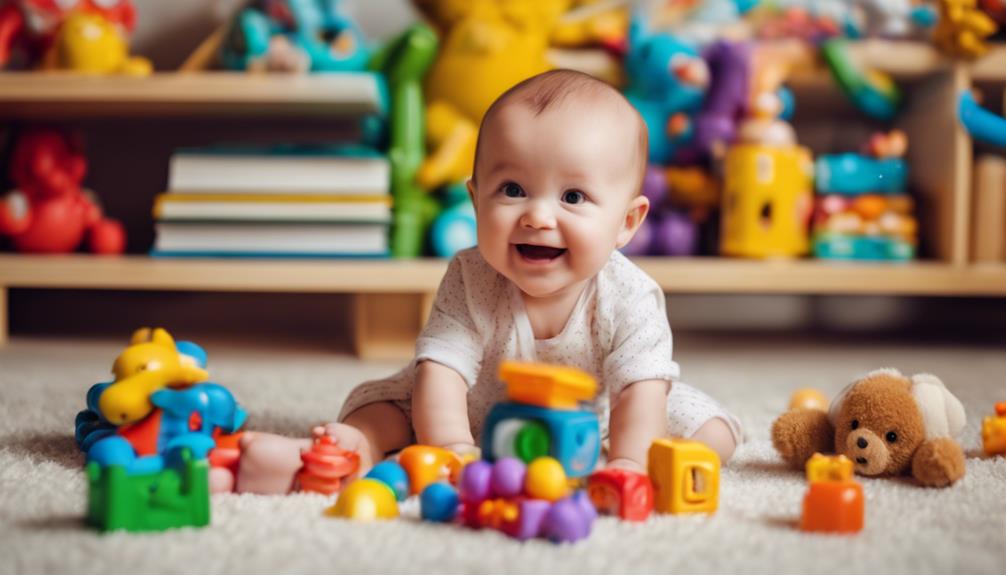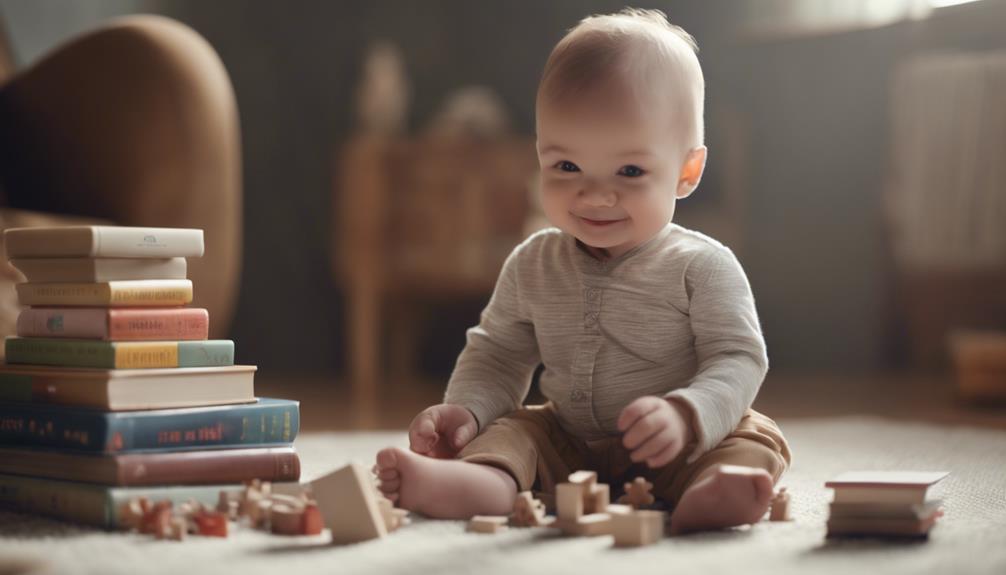If your partner talks about baby names, nursery decor, and family plans, he may be interested in having a baby with you. Is he ready for the responsibilities of raising children and does he appear emotionally prepared? How does he handle financial matters and discuss family expenses? Talking positively about the future, marriage, and parenting could indicate a strong commitment. Watch how he interacts with children; does he connect well and enjoy spending time with them? Paying attention to these signs can give you a glimpse into his desire for parenthood. Understanding these clues can provide insight into your partner’s feelings about starting a family.
Key Takeaways
- Expresses excitement about starting a family together.
- Discusses family planning and future children openly.
- Shows emotional readiness and commitment towards parenthood.
- Engages actively in childcare responsibilities and discussions.
- Demonstrates a strong desire for a stable and loving family environment.
Baby Talk Frequency
Pay attention to how often he brings up discussions about babies, pregnancy, and parenting to gauge his interest in starting a family with you. If he frequently engages in detailed conversations about family planning, child-rearing, and future children, it could be a sign that he's excited about the idea of having a baby with you.
Take note of his readiness for fatherhood through his baby talk frequency. Does he show enthusiasm when discussing potential baby names or nursery decorations? These are all indicators that he may be looking forward to starting a family.
Interest in Family Planning

An indicator of his interest in family planning is the presence of discussions about marriage, children, and future aspirations. Here are some signs to look out for:
- Starting a Family: A clear interest in starting a family is reflected in conversations about raising children, creating a stable home environment, and envisioning a future together.
- Financial Planning: Demonstrating readiness for family life includes planning for the future financially. Look for discussions about saving for major family needs like a house, education, and healthcare.
- Emotional Readiness: Being emotionally prepared for parenthood involves expressions of love, commitment, and support. Pay attention to how he shows care and readiness for the emotional aspects of family life.
- Signs of Readiness: Signs like discussing baby names, actively engaging in childcare responsibilities, and expressing excitement about the idea of family life are strong indicators of his readiness to start a family with you.
Emotional Readiness

Expressing deep feelings and commitment towards you is a key indicator of emotional readiness for starting a family. When your partner shows trust, intimacy, and affection, it signifies a strong emotional foundation that's vital for welcoming a new member into your lives.
These signs of emotional readiness can manifest in various ways, such as moving towards unprotected intimacy and feeling joy at the thought of potential pregnancy scares. By focusing on building emotional connections and demonstrating a serious commitment to your relationship, your partner may be signaling their readiness for parenthood.
It's important to pay attention to how your partner communicates their feelings towards you and how they prioritize your emotional bond. Discussions about family planning, future expenses, and the overall well-being of your relationship can be strong indicators of emotional and practical readiness for starting a family.
Financial Stability

When considering starting a family, evaluating your partner's approach to financial stability is key. Here are four signs to look for that indicate he may be ready to have a baby with you:
- Saving Money: Men who prioritize saving money for future expenses such as childcare and education demonstrate readiness for parenthood.
- Planning for the Future: Showing a commitment to planning for a secure financial future is a strong indicator that he's prepared to provide for a family.
- Budgeting: Responsible behavior like budgeting and managing finances well is essential for successful parenting and signals a readiness for the challenges of raising a child.
- Discussing Expenses: Engaging in conversations about financial planning and expenses related to having a baby shows serious consideration and readiness for starting a family.
Evaluating these aspects of your partner's financial behavior can provide insight into his readiness and willingness to undertake the journey of parenthood with you.
Long-Term Commitment

Long-term commitment in a relationship often becomes evident through discussions about shared goals and future plans. When your partner expresses a positive view towards marriage and links it with having children, it signifies readiness for a lasting commitment.
A man who actively engages in conversations about family planning and financial stability is showing a serious approach to building a future together. Prioritizing saving for future expenses and creating a family vision are key indicators of his commitment to family life.
These discussions not only demonstrate his willingness to take on the responsibilities of starting a family but also indicate his desire to create a stable and loving environment for you and your future children.
Interaction With Children
Observe how your partner interacts with children to gain insights into his potential readiness for fatherhood. It's important to pay attention to his actions, as they can reveal a lot about his feelings towards having kids.
Here are some key things to look for in his interactions with children:
- Patience: Watch how he handles challenging situations with kids calmly and patiently, as this highlights his ability to handle the ups and downs of parenting.
- Care: Notice if he shows genuine care and concern for children's well-being, as this reflects his nurturing instincts and readiness to prioritize a child's needs.
- Interest: Look for signs of genuine interest in playing, talking, and spending time with children, showing his desire to engage with them on a personal level.
- Empathy and Understanding: Observe how he responds to children's emotions and needs with empathy and understanding, indicating his capacity to connect emotionally and supportively with kids.
Expressing Parenthood Desire

By openly communicating his desire to have children with you, he's expressing an important readiness for parenthood and a strong commitment to building a family together.
When he talks about potential baby names and family planning, it shows that he's invested in the idea of starting a family with you.
Engaging in detailed conversations about raising children and discussing practical aspects of parenting, such as education and emotional readiness, are clear signs of his genuine interest in fatherhood.
These conversations are vital in understanding his perspective and readiness for parenthood. His willingness to discuss the practical aspects of parenting indicates that he's not only emotionally prepared but also considering the responsibilities that come with raising a child.
If he displays excitement and readiness for parenthood, along with financial preparation for the future, it's a strong indicator that he's serious about wanting a baby with you.
Keep the dialogue open and explore these topics together to make sure you're both on the same page when it comes to building your future family.
Frequently Asked Questions
How Do You Know if a Man Wants to Have a Baby With You?
Pay attention to discussions about future plans, family life, and commitment. Look for signs of excitement, detailed talks about children, and emotional readiness. If he talks about baby names, nursery ideas, and family planning, he may want a baby with you.
How Do You Tell He Wants to Get You Pregnant?
When he plants seeds of desire with intention, nourishing a future with you, it's in his touch, his words, his gaze. He's not just talking, he's showing you – baby steps towards forever.
How Do Guys Feel When Their Girlfriend Is Pregnant?
When your girlfriend is pregnant, you might feel a mix of emotions. Some guys are surprised, happy, anxious, or confused. Communication and support from your partner play an essential role in how you navigate impending fatherhood.
Do Men Get Baby Fever?
Yes, men can get baby fever! Believe it or not, studies show that around 53% of men experience baby fever. So, if you notice your partner showing signs of wanting kids, he might be catching the fever!
Conclusion
To sum up, paying attention to these signs can help you determine if your partner is ready for a baby. Remember, communication is key in any relationship, especially when it comes to such an important decision.
One study found that 82% of couples who openly discussed their desires for children felt more confident and secure in their relationship. So don't be afraid to have that conversation and see where it leads!









